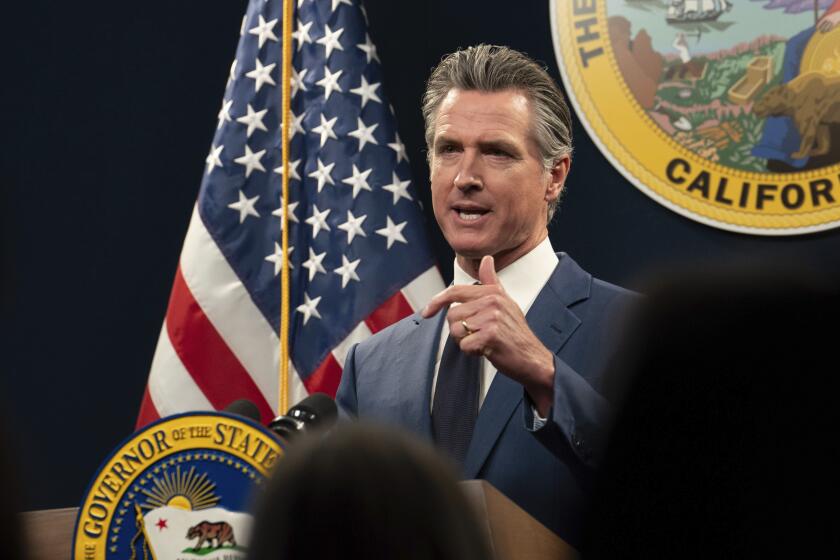Medicare, Welfare, Budget Dog Politicians on Stump : Politics: After spring break, Democrats claim to see silver lining in public’s mood--loss of support for GOP ‘contract.’ But they themselves face tough sell.
It was a crisp and clear New England spring morning as Democratic Rep. Sam Gejdenson swerved his mud-spattered Jeep into the parking lot of the Stop & Shop, bounded across the pavement and positioned himself in front of the supermarket’s swing doors.
“Hello, how are you? I’m Sam Gejdenson,” he told a startled woman emerging from the store with her two children and a load of groceries. “Your congressman,” he added helpfully.
“Don’t tell me you want my vote again!” the woman exclaimed as she veered her cart sharply out of Gejdenson’s way and headed for the parking lot.
“Good morning, I’m Sam Gejden-,” he started to tell another shopper.
“I know who you are,” she interrupted. “And I already have one of your potholders!”
Such reactions reflect the problems that both sides of the political aisle--but particularly Democrats--face as they try to win voters’ allegiance in the upcoming debates in Washington over Medicare, welfare reform and the budget deficit.
But if it seems that politicians on the stump are about as unwelcome as panhandlers, Democrats returning to Washington after their spring break claim to see a silver lining in the public’s mood.
“People have come back from this break realizing the programs the Republicans put forward aren’t sitting well in their districts,” said Rep. David E. Bonior (D-Mich.), the House minority whip. “The Republican plan . . . is losing support, day by day and month by month.”
Girding for the legislative battles that resume in earnest this week, Democrats like Gejdenson hope to tap into the electorate’s anxiety by portraying themselves as defenders of the middle class--a strategy that they hope will pay off as Republicans begin to specify which programs they will cut to balance the budget by the year 2002.
“Our counteroffensive is coming in May and June, as they start putting out specific pieces of the budget,” said Rep. Jim McDermott (D-Wash.). “The tide is turning as people realize how the ‘contract with America’ will impact on their lives.”
But as they plotted strategy for coming months at a retreat over the weekend, the Democrats had to acknowledge that the message from their districts is mixed. For if polls show that voters have not completely bought into the GOP agenda, it is also evident that the Democrats have yet to redeem themselves in the eyes of the electorate.
Outside the Groton Stop & Shop, some shoppers stopped to compliment Gejdenson or talk about local issues, but two themes recurred: profound mistrust of politics and a deep anxiety about jobs and financial security.
Groton, New London, Mystic and the other picturesque old towns that dot the eastern shore of Connecticut are not unlike many other areas of the country that have been forced to adjust to changing economic times. But, like parts of Southern California, this area also has been hit by another wrenching change: the end of the Cold War.
Electric Boat, the Groton division of General Dynamics that makes the Navy’s Seawolf submarine, is still the area’s largest employer. But its work force has been halved in recent years to about 12,000 workers. And over the next few years it is expected to lay off 6,000 more as Congress moves to eliminate the Seawolf program.
While other industries, such as pharmaceuticals and tourism, are picking up, the service jobs that have replaced much of the area’s defense manufacturing base offer neither the security, the esteem nor the high pay that the predominantly blue-collar work force once took for granted.
“They’re worried about their jobs. They’re ticked off. They’re angry. But they don’t know how to direct it,” a Gejdenson aide said.
The region is overwhelmingly white and blue-collar. Only 7% of the population is nonwhite. Although they usually pick Republicans in presidential races, the voters have been considered solidly Democratic on the congressional level.
But despite what business leaders say has been a tireless effort by Gejdenson to save the Seawolf program and protect jobs in the district, last year a Republican state senator, who even GOP insiders admit was a lackluster candidate, came within 21 votes of defeating him. What’s more, the Republican, Edward Munster, was forced to share what was seen as a strongly anti-incumbent vote with an independent candidate closely allied to Ross Perot, who in the second district polled 27% in the presidential race.
To Republicans, this suggests that Gejdenson, an eight-term liberal whose near-death experience last year earned him the nickname “Landslide Sam,” could be an easy mark next year. “He’s at the top of our target list,” a GOP congressional campaign strategist confirmed.
Democrats agree that Gejdenson looks vulnerable. But they predict that Democrats will begin to shore up their positions as the budget debate progresses.
Not all the experts are convinced, however. While they agree that the Republicans may have overstepped their mandate and pushed too far and too fast with many of their reforms, some analysts also believe that Democrats may be drawing the wrong lessons from what they learned in their districts over the spring break.
“Most voters, right now, still basically think the Republicans are moving in the right direction, but they also think they are going too far. They’re grateful to the Democrats for checking the Republicans but still think they have their heads in the sand,” said Charles Cook, a Washington-based political analyst.
Many analysts see deeper reasons for the continuing vulnerability of Gejdenson and other Democrats: endemic problems that the party has not yet addressed. Among the problems are President Clinton’s low approval ratings, the popularity of term limits and the cultural--if not precisely ideological--conservatism that seems to be sweeping the country as people trade one kind of insecurity for another in the ambiguity of the post-Cold War world.
More to Read
Get the L.A. Times Politics newsletter
Deeply reported insights into legislation, politics and policy from Sacramento, Washington and beyond. In your inbox three times per week.
You may occasionally receive promotional content from the Los Angeles Times.






